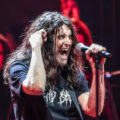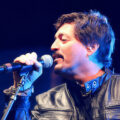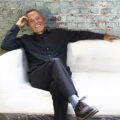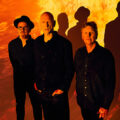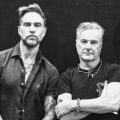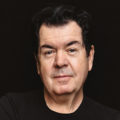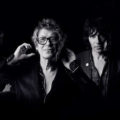Scotland’s Big Country making rare pilgrimage to America for Des Plaines, Arcada Theatres
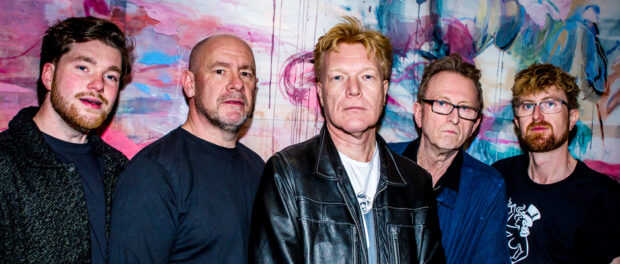 lamb19lies74
lamb19lies74
Few singles from the 1980s or otherwise are more iconic than Big Country’s “In A Big Country,” and despite the Scottish rockers spending the bulk of their time overseas, the band has since developed quite a cult following in America.
Thankfully, they’ll be back after what feels like forever, bringing the “Eastworld” Tour to the Des Plaines Theatre on Friday, June 13 and the Arcada Theatre on Saturday, June 14, each alongside fellow MTV regulars Tommy Tutone (“867-5309/Jenny”), Gene Loves Jezebel (“The Motion Of Love”) and Bow Wow Wow (“I Want Candy”).
It’s slated to be a “Totally ‘80s” time indeed, but as original guitarist Bruce Watson tells Chicago Concert Reviews, the latest line-up is committed to not only polishing up previous demos on a new album of the aforementioned name, but forging forward on the road to build upon a unique foundation of new wave and alternative rock elements, crossed with Celtic and folk flavors.
What do you remember about performing around Chicago over the years?
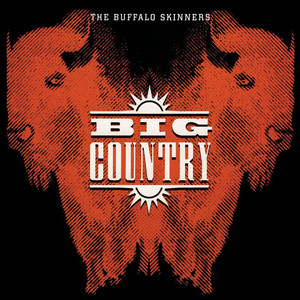 Bruce Watson: It’s one of my favorite cities and I’m not just saying that. I do love it. I remember we haven’t been to Chicago in a long time, probably since we did “The Buffalo Skinners” Tour way back in the ‘90s. For some strange reason, I do remember really late at night going to Due for a pizza (laughs).
Bruce Watson: It’s one of my favorite cities and I’m not just saying that. I do love it. I remember we haven’t been to Chicago in a long time, probably since we did “The Buffalo Skinners” Tour way back in the ‘90s. For some strange reason, I do remember really late at night going to Due for a pizza (laughs).
I’m just really looking forward to going to Chicago again. My wife has been watching re-runs of “Chicago Med” and “Chicago Fire.” When I’m watching that, I just remember being there, how beautiful the architecture is there, the lake. I wasn’t there for long. I didn’t quite explore, but I went for a wander, and looked at some of the architecture and I’m going, “It’s beautiful here.” I’m just really looking forward to getting out there, doing a great show and going for a pizza afterwards!
Give us a preview of what you have planned for the Des Plaines and Arcada Theatres.
Watson: It’s part of a package tour, so I don’t know how long of a set we’ve got, but we’ll be doing mainly the hits and we’ll probably chuck in a couple of songs from the new album that we’re working on at the moment. When you do these package tours, you kind of have to play the hits as well because that’s what people paid their money to come and see I guess.
What can everyone expect from the upcoming “Eastworld” album?
Watson: Basically I can’t let the cat out of the bag, but these songs are all songs that were written by Big Country and they were only demoed. They weren’t developed. Some of the songs ended up on B-sides. It just kind of felt quite tough coming up with new material when you’ve got such a great back catalogue, so we wanted to revisit some of the lesser known Big Country songs that were just demoed and never finished. A lot of the songs were just [late singer] Stuart Adamson, [former bassist] Tony [Butler], myself and a drum machine. They were just demos. We never got a chance to finish them off, and then what happened was sometimes the record company would say, “We need some extra songs for a B-side or a 12-inch, and you go, “Oh, we’re on tour. We can’t get in the studio” and then they just end up using these demos. So they have been out in some form or another, but I think we’ve taken it a step further, gotten the whole band involved and got a little more contemporary sounding. They’re proper recordings instead of just demo recordings. At least a lot of these songs will be familiar to people that are fans of Big Country already…I think it’s one of those things you have to witness. Come and see it.
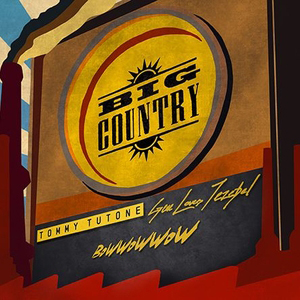 This seems to be a very 1980s-themed tour.
This seems to be a very 1980s-themed tour.
Watson: It is an ‘80s-themed tour, and to be honest with you, there’s no shame in that because we are from the ‘80s after all! I guess if you’ve got to slap a label on it, you can’t call us a “‘70s tour,” so you have to call it an “‘80s tour.” I’m not familiar with Tommy Tutone. I guess he’s an American guy, but Gene Loves Jezebel, Bow Wow Wow, they both have a great catalogue as well. It’s gonna be good. It’s gonna be interesting to see how long each band gets so I can work out a set. I hope we get a good set, an hour or more hopefully.
What do you recall about first rising to fame during that decade and the contributions you made to the era?
Watson: …I don’t see ourselves as being famous. We always saw ourselves as being musicians. We’re all musicians first and foremost. We like to collaborate together, write songs together and record together. The best thing of all was getting to go on tour and share the songs with people who want to hear it in as many territories as we could manage. We just wanted to make good songs, great records and do great gigs. I think we did that for awhile.
Is there anything about band’s sound you feel helped set you apart from everyone else?
Watson: I don’t know, but there were other bands, groups like Simple Minds, The Alarm, U2, The Pretenders, Echo And The Bunnymen, New Order even that were all doing their own kind of songs. Every one of those bands had their own identity and their own sound. I’d have to say we just did what we did. We didn’t try and do anything like that. We didn’t want to sound like anyone. It wasn’t contrived. I think all the groups I mentioned, they all had good quality control as well.
Your hugest hit, “In A Big Country,” is easily one of the most iconic songs of then and still now. What has it meant to you over the years?
Watson: I’m an original member. I’ve been in the band since 1981, for over 40 years, and it’s a song that I never get tired of playing, even [hearing] on the radio. I don’t wince. I think what I love about it the most is Stuart’s harmony vocals. It’s the first time I heard Stuart do harmonies like that. I was completely taken aback when I heard it. When we demo songs, we always record them instrumentally and we’d get it on cassette at the time. Then he would come back and add his vocals. “In A Big Country” was a such a “wow” moment, such a real pleasant surprise. I never knew he could sing like that, you know? I knew he could sing, but when he brought those multi-harmonies out, it was like, “wow!”
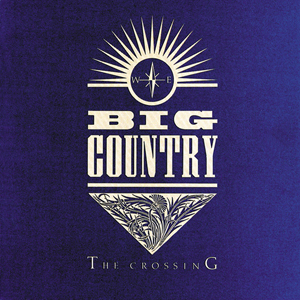 What do you consider to be some of Big Country’s other essential moments?
What do you consider to be some of Big Country’s other essential moments?
Watson: I think the first three albums, [“The Crossing,” “Steeltown,” “The Seer”] are the ones that everybody, all the fans, go for. We hit a sort of strange patch for awhile, and I’m not saying albums after that were substandard, but they were just a little bit different. Then we got to the ‘90s and the whole grunge thing started out. Coincidentally, we were getting a bit more rockier and we did “The Buffalo Skinners.” That’s the album we [last] toured America quite extensively with, so the “The Buffalo Skinners” is a big favorite of mine.
You’ve always been enormously popular overseas and obviously America knows you as well, but you didn’t come here as much. Why was that?
Watson: No we didn’t because you can’t be in two places at one time. We did two massive tours in the U.S. back in the early ‘80s when we had “In A Big Country” and “Fields Of Fire” out. Before and after, we were also touring in Europe and other places. It just got to a point where we were touring everywhere. We would’ve liked to come back to America and done some more, but you have to do your second album. That takes a bit of time because you’ve never written any songs for it and then things change. To be honest with you, I would’ve liked to have spent a lot more time in America than we did, but because of circumstances, we couldn’t do it. The last time we were in America was just as COVID was happening. We did a few shows out there: New York, Miami, went on a cruise and San Francisco. Then COVID broke out and it was like, “We have to go home now.”
In what ways do you hope people will remember your original singer, Stuart?
Watson: I think, subconsciously, Stuart will be on that stage. Stuart’s always there in my mind anyway. You cannot help but think of Stuart when you’re up there playing the songs and I think fans, hopefully, will feel that way as well, especially when they hear some of the songs that were identifiable with Stuart. Just come along to the show. Shows are more than just a group [performing] and rowdy [reactions]. There’s something spiritual there as well. And I’m not saying “religious,” but there’s definitely something spiritual there. Just come along and watch.
How do you feel regarding your time with Mike Peters from The Alarm as the lead singer, especially in light of his recent passing?
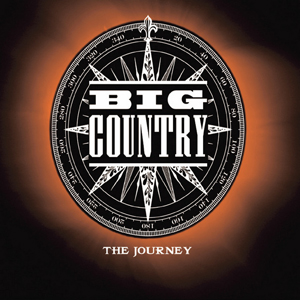 Watson: When Mike came on board, it was a breath of fresh air. I discovered that there’s people that I can write music with and there’s people I can’t write music with, obviously Stuart being one of the ones I could write music with. But when Mike came on board, it was just so natural and easy. Mike and I wrote most of the album, [“The Journey”], along with my son Jamie as well. I’ve always said that Mike had a “Superman” shirt under his jacket. The guy’s [energy] was immense. I mean I would get tired being in his company because he was just an amazing guy. I [went] to his funeral, and again, another great friend.
Watson: When Mike came on board, it was a breath of fresh air. I discovered that there’s people that I can write music with and there’s people I can’t write music with, obviously Stuart being one of the ones I could write music with. But when Mike came on board, it was just so natural and easy. Mike and I wrote most of the album, [“The Journey”], along with my son Jamie as well. I’ve always said that Mike had a “Superman” shirt under his jacket. The guy’s [energy] was immense. I mean I would get tired being in his company because he was just an amazing guy. I [went] to his funeral, and again, another great friend.
Tell us a bit about the latest configuration of the band.
Watson: At the moment, the band consists of myself and Jamie on guitar. We’ve now got a guy called Reese [Dobbin], an absolutely amazing drummer. He’s a lot younger than me. I came across him before and Jamie knew him. We’ve got two other guys, a guy called Tommie Paxton, who’s playing guitar and doing vocals, and Chris Stones, who’s playing bass. They both play in a Big Country tribute band called Restless Natives. They only do so may shows a year and can come with Big Country. I’ve met Tommie briefly once or twice. I’d never met Chris, but nowadays everything’s out there online, so I went on YouTube, and I watched them and listened to them. If you shut your eyes, they’re doing the songs pretty much verbatim the way that we did them and I was just blown away, so I gave Tommie a call.
I told him it was just gonna be a few gigs, but the gigs worked out and it’s [now] more than a few gigs. Everybody came in full time and everybody’s invested in this. We’ve got this album that’s nearly finished and a lot of gigs. Everybody’s just so enthusiastic with getting out there. [We have] a new management team behind us. It really is like a breath of fresh air for me, and apart from the early days of Big Country, it’s the first thing I’ve been so enthusiastic about, working with such great musicians and great people as well.
You’re the only member to have performed on literally every single album and tour. From then until now, what are the encounters you’ve treasured the most?
Watson: Oh, lots of things, just because it’s the first thing that happens. Doing the first radio session, making my first record in a recording studio, having a successful album, getting on the road, getting a John Peel radio session, then coming out to America. The first gig was in New York. We were supporting Darlene Love and played at, if I remember, the Peppermint Lounge, which is famous. I always remember getting off the flight at JFK [Airport], the smell (laughs), the heat and just the vibe in Manhattan. Then we got nominated for two Grammys and went out to L.A., to Hollywood. Again, get off the plane at LAX, the heat, the smell, seeing the Hollywood sign. It’s just nuts. I just knew this is what I wanted all my life. It went on like that for a few years. You do a few things, and I’m not saying you become jaded, but it becomes normal after awhile. I think the first time that you do something like that, it really is amazing.
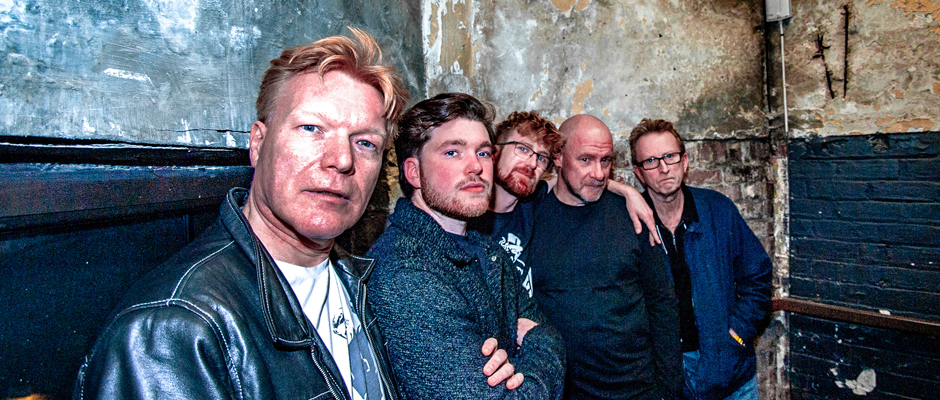 What are your hopes for this current season with Big Country?
What are your hopes for this current season with Big Country?
Watson: My hope is it lasts awhile. I’m 64 now, and I’m not saying that I’m old, but it’s like my head and my heart love doing it, it’s just my body sometimes says, “You stupid person. You shouldn’t be doing this!”
I really love these guys. There’s a chemistry with these guys that I’ve not had since the original line-up, when the chemistry was there, and then when Mike came along, there was another chemistry there. I’m not saying new songs at the moment because the future’s unwritten, but there’s certainly still more songs in the back catalogue that needed a little bit of work done and just going out with these guys, not touring as in you’re away from home for six months at a time. It can be done more comfortably these days, as long as we can continue to work.
The business of Big Country will always go on no matter if we’re performing or not. I’m not a businessman, but I’ve always been keenly involved in all the back catalogue releases and stuff like that. [In] the next two or three years, hopefully [we’ll] get another album out and just keep this going because what we’re doing is too good to stop doing it. Also, we seemed to have gained interest from people, especially in America. I never thought I’d get a chance to go back to America, but because of this new line-up and we’re doing stuff, there seems to be a renewed interest, which is really refreshing. I’m gonna work…as long as our bodies can hold up. We’re not teenagers anymore (laughs).
Big Country performs at the Des Plaines Theatre on Friday, June 13 and the Arcada Theatre on Saturday, June 14. For additional details, visit BigCountry.co.uk, DesPlainesTheatre.com and ArcadaLive.com.

